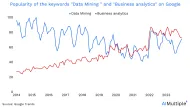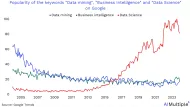Data Science Competition: What it is & How it works 2024
Are you a data scientist who is looking for real-world data science problems to sharpen your skills? Or maybe your organization has hard to solve data science problems while your data science team is busy with other projects. For either case, a data science competition platform can help.
Data science competitions help organizations solve complex business problems while enabling data scientists to learn from the experience and win awards. Organizations need to define the problem, provide data and put a prize on the challenge. Competing data scientists build and present different algorithms to be the winner.
What are data science competition platforms?
Data science competition platforms enable data science experts and enthusiasts to solve real-world problems, through challenges. These platforms serve as a solution marketplace for complex real-world data science problems.
The concept of platforms is simple. Businesses define their problem, provide the required training data and offer awards in exchange for a solution. Crowdsourced data scientists apply for the competition and provide the best possible solution. Their solutions which are built based on the training data are tested on previously undisclosed test data. Teams whose solutions perform best on the test data are awarded.
What are the benefits for businesses?
These platforms provide win-win cases for businesses and data scientists. Data scientists even when they don’t win, learn from competing against others to solve real-life business challenges.
For businesses these competitions provide 4 benefits:
- Cost savings: Hiring a single data scientist is costly. As of 2022, the average annual salary of a full-time data scientist is $125,336 in the US.1 Thanks to data science competition platforms, companies can rely on the wisdom of the crowd to solve their organizations’ data science projects without employing numerous data scientists to solve their specific AI challenges. Since awards are less than data scientist salaries, companies have the opportunity to realize significant savings.
- High-performance solutions: Businesses choose the project that has the highest accuracy. In any other setting, they would need to settle with the only solution that they are presented or choose among 2 solutions presented by vendors. Competitions allow them to choose from numerous solutions, unlocking innovative approaches.
- Employer branding: These competitions help data scientists recognize the company’s brand and familiarize themselves with the companies’ challenges. This helps companies hiring efforts.
- Talent identification: Organizations can post example data science case studies in these platforms and examine the work of crowdsourced data scientists. If they like their expertise and approach on the topic, companies may hire them for upcoming projects.
How can businesses leverage these platforms?
Rayner 2 explains in detail that in cases where participants have small differences performance, companies need very large test sets to identify that a submission in a competition is better than another in a statistically significant way. So unless you have a very large test set these competitions are not really good to identify the best model. And in most cases, there is limited labelled data to be used in test dataset.
Competitions should be seen as a way for companies to identify different approaches for tackling their problem. They should not just take the best performing solution which may just have overfit the test set in a slightly better way. They should look at top solutions to see how they approached the problem and learn from them. They can work with some of the top performing teams to build the actual solution.
Which problems are more suitable for competitions?
Data science competitions differ from standard data science projects. As its name refers, these platforms should provide competition and the winner gets a prize. Therefore ideal problems are
- harder than standard data science projects: It takes a bit of effort to formulate the problem and prepare the data. It is not worth going through that effort for a challenge that will take an in-house data scientist a few days to solve. To maximize the benefits, host companies should launch competitions that targets their most difficult problems.
- without an existing solution: Most of the time, it is Once a problem is solved, it is all over the internet and anything gets old too fast. If the competition is about a new hot topic, competitors spend more time on the topic to perform extended research, customize algorithms, train advanced models, etc.
- measurable in terms of relative performance: To crown a winner, the accuracy of the model should matter so that hosts can score each solution againts others.
- important: Running a data science competition will take time and effort. Competitions should be run for problems where a performance improvement can bring benefits of >$10k per year.
What are the challenges of launching data science competitions?
Though there are challenges to launching data science competitions, competition organizers tackle almost all of these challenges for the company who wants to launch the competition.
Writing the problem statement
Data science competitions are more than just loading up data into a software package and running some algorithms. Data scientist competitors must understand the broader business problem to identify how to optimize the solution effectively.
De-identifying/encrypting data to be used in the competition
Since competition involves sharing data with competitors, data needs to be encrypted. While the encryption should not be breakable by the competitors, the models built using the encrypted data should also function on the original data. There are numerous algorithms achieving such properties such as homomorphic algorithms and data science competition organizers are familiar with the selection of appropriate algorithms.
Attracting talented data scientists to the competition
While this can be a challenge for a company running its own data science competition, there are companies that run data science competitions and have access to large communities of data scientists.
What is the process of launching a competition?
In general, there are three information companies should provide to launch a competition:
Defining problem: Give a general summary of the challenge, what problem it should solve, and how it will be run. What is the significance of the task and the potential impact of the challenge?
Presenting data: Datasets can range from structured quantitative data to text, images and video. If necessary, the data science competition organizer would encrypt the data or support the company in encrypting its data.
Funding: The funds required to support the cost of hosting the competition and the prize pool for rewarding winners.
What are examples of data science competition platforms?
AIcrowd
AIcrowd is a platform that runs AI, machine learning, and other data science challenges. AIcrowd helps businesses, universities, government agencies, or NGOs develop, manage, and promote challenges. Machine learning and data science specialists and enthusiasts work collaboratively to find solutions that are accurate, efficient and effective.
bitgrit
bitgrit is a platform that enables data scientists to interact with a global network and community. bitgrit’s competition platform aims to solve companies’ challenges efficiently using wisdom of the crowd. Other services bitgrit offers include AI consulting and data visualizations like their COVID tracker.
Coda Lab
CodaLab is an open-source platform that provides an ecosystem for conducting computational research in a more efficient, reproducible, and collaborative manner. There are two services CodaLab offers:
- allowing businesses to capture complex research pipelines in a reproducible way
- enabling data scientist to enter a competition to solve problems that companies host
CrowdANALYTIX
CrowdANALYTIX offers cloud crowdsourced analytics services that convert business challenges into analytics competitions and address solutions that require predictive analytics, descriptive analytics, estimations, and business hypothesis validation. Their crowdsourced community consists of 25000 data scientists across 50 countries and they have built almost 80000 models so far. Their community works with public data, simulated data, or data behind organizations’ firewalls while prioritizing data security.
DrivenData
DrivenData differentiates from other data science competition platforms with their mission. They focus on social challenges of mission-driven organizations that will eventually impact the world. Some example competitions are predicting the level of damage caused by the earthquake, predicting water pumps that are faulty to promote access to clean water in Tanzania, predicting offensive contents that violate Facebook’s policies.
InnoCentive
InnoCentive is a cloud-based innovation management platform that connects commercial enterprises, public sector agencies and nonprofit organizations with 400000+ to innovate faster and better. InnoCentive have conducted over 2,000 external data science competitions for organizations including NASA, DARPA, Thomson Reuters, AstraZeneca, GSK, Anheuser-Busch InBev, and Ford Motors.
Kaggle
Kaggle offers both public and private data science competitions and on-demand consulting by a global data science and developer talent pool. Inside Kaggle, users can work in public API where they can reach 19,000 public datasets and 200,000 public notebooks to solve real-world problems across a diverse array of industries including pharmaceuticals, financial services, energy, information technology, and retail.
If you want to solve your data science problems with the help of consultants, feel free to read our data science consulting article.
If you want to take advantage of data science competitions to build low-cost, effective AI solutions, you can also view our data-driven list of data science consultants, and contact us:
If you still have questions about data science competitions, we would like to answer them:
External Links
- 1. “Data Scientist average salary in the USA, 2023.” Talent.com. Revisited January 16, 2023.
- 2. Rayner, L.O. (September 19, 2019). “AI competitions don’t produce useful models.” Laurenoakdenrayner. Revisited January 16, 2023.

Cem has been the principal analyst at AIMultiple since 2017. AIMultiple informs hundreds of thousands of businesses (as per similarWeb) including 60% of Fortune 500 every month.
Cem's work has been cited by leading global publications including Business Insider, Forbes, Washington Post, global firms like Deloitte, HPE, NGOs like World Economic Forum and supranational organizations like European Commission. You can see more reputable companies and media that referenced AIMultiple.
Throughout his career, Cem served as a tech consultant, tech buyer and tech entrepreneur. He advised businesses on their enterprise software, automation, cloud, AI / ML and other technology related decisions at McKinsey & Company and Altman Solon for more than a decade. He also published a McKinsey report on digitalization.
He led technology strategy and procurement of a telco while reporting to the CEO. He has also led commercial growth of deep tech company Hypatos that reached a 7 digit annual recurring revenue and a 9 digit valuation from 0 within 2 years. Cem's work in Hypatos was covered by leading technology publications like TechCrunch and Business Insider.
Cem regularly speaks at international technology conferences. He graduated from Bogazici University as a computer engineer and holds an MBA from Columbia Business School.
To stay up-to-date on B2B tech & accelerate your enterprise:
Follow on

Comments
Your email address will not be published. All fields are required.